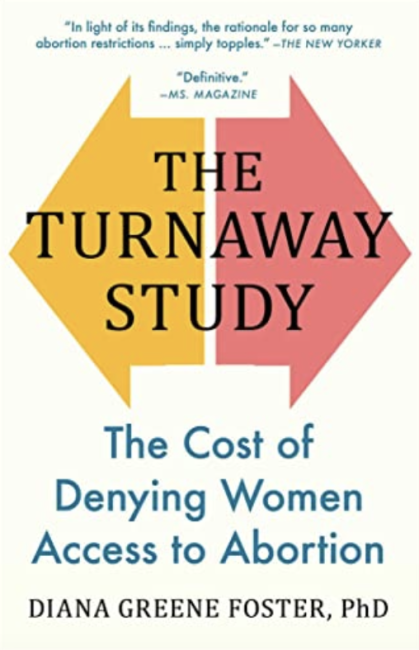You have /5 articles left.
Sign up for a free account or log in.

‘The Turnaway Study’ was published in 2020 to much acclaim. Now the integrity of a paper criticizing it is being investigated.
Amazon
Frontiers in Psychology, a peer-reviewed open-access journal published by Frontiers Media, is investigating a recent paper criticizing a landmark study on abortion and maternal well-being.
Frontiers published an expression of concern—separate from the review article itself—last month, after readers pointed out that the article had been edited and peer reviewed only by scientists with antiabortion views. The editor and three out of four reviewers are affiliated with one antiabortion group in particular.
The author of the investigated paper says she’s consulting lawyers. The author the original study says she’s been waiting seven weeks for the journal to publish her accepted response—during which time abortion figured into the midterm elections and voters in five states weighed specific abortion rights measures.
Jamie Barclay, a spokesperson for Frontiers, said Friday that “regardless of the publication stage or subject of a manuscript, if the integrity of an article is called into question, our policy is to investigate. Several concerns have been raised about the integrity of this article and its peer-review process by members of the public, and an investigation is now underway.”
The Turnaway Study
Demographer Diana Greene Foster, professor of obstetrics, gynecology and maternal health and director of the Bixby Population Sciences Research Unit at the University of California, San Francisco, published what’s known as the “turnaway” study in 2020 to much acclaim: in the largest study of women’s experiences with abortion to date, she and her team identified 1,000 women who’d sought abortions and kept in touch with them for five years. Some of the women in the group had been turned away (hence “turnaway”) from abortion providers for being up to three weeks over the gestational limit, so Greene Foster was able to draw comparisons over time between patients who got abortions and those who wanted them but were denied.
Beyond scope, Greene Foster's work was lauded as solving comparison group problems apparent in earlier work on this topic, which tended to compare outcomes among women who’d had abortions and women who’d never had them because they never wanted them in the first place. Put another way, Greene Foster was comparing women who wanted abortions with women who wanted abortions (some of whom got them), versus women who wanted abortions and women who didn’t.
Prior to beginning the turnaway study in 2008, Greene Foster had mostly published on contraception. But she’s said she focused on abortion to answer a question that then Supreme Court Justice Anthony Kennedy implicitly raised in 2007, in writing the majority opinion for Gonzales v. Carhart, another case involving abortion: whether abortion negatively affects a woman’s mental health. Kennedy wrote that he had “no reliable data” on the topic but that it “seems unexceptionable to conclude some women come to regret their choice to abort the infant life they once created and sustained” and that “severe depression and loss of esteem can follow.”
Was that true? Thousands of subject interviews later, Greene Foster could say that Kennedy’s assertion didn’t bear out. Ninety-five percent of women in the turnaway study who had abortions said that this was the right choice five years later, and women who had abortions were not more likely than those denied to have depression, anxiety or suicidal ideation.
The study did show negative outcomes for women denied abortions who had to carry their pregnancies to term, however: they had four times higher odds of living below the federal poverty line and were more likely to stay tethered to abusive partners, among other problems. Even the existing children of women denied abortions had lower average developmental scores than those of women who’d received abortions, suggesting that abortion could benefit not just women but also their families.
The turnaway study was published in book form in 2020, but it’s actually made up of 50-some individual papers previously published in major peer-reviewed publications, from The Journal of Pediatrics to Psychological Medicine to Annals of Internal Medicine. This means that Greene Foster's work has been scrutinized many times over by experts in various fields via the peer-review process.
‘Science Upended’
In June, however, Frontiers in Psychology published a review article called “The Turnaway Study: A Case of Self-Correction in Science Upended by Political Motivation and Unvetted Findings.” Author Priscilla K. Coleman, professor of human development and family studies at Bowling Green State University, argued in the piece that the turnaway study is “ambiguous” about its recruitment procedures, and that it’s therefore impossible to know for certain whether women in the study were “systematically different” from the larger population of women seeking abortions.
Noting that the total number of women who persisted in the study for the full five years postabortion was 516, not the initial 1,000 (which the turnaway study acknowledges and attributes to the challenges of longitudinal studies), Coleman wrote, “The Turnaway Study researchers attempted to make generalized claims about women seeking abortion when the study itself likely did not even consider over 95 percent of women receiving abortions at the facilities included in the study. Given the extremely small percentage of women from the population represented in the sample, generalizations are precluded.”
Coleman also said that the turnaway study should have done more to compare women who had abortions early in their pregnancies to women who had them later, and that it should have included a control group of women who didn’t choose abortion at all (despite this exclusion being an intentional design feature of the study).
Calling the turnaway study “some of the poorest work in the field,” she cited some of her own research, among other studies, linking negative maternal mental health outcomes to abortion. “When the impetus for the Turnaway Study and the deficiencies of the methodology employed are closely scrutinized,” she said, “one is left grappling for answers as to how the authors have managed to populate the professional literature with dozens of articles, while shutting down dialogue on the complex question regarding whether or not abortion increases risk for mental illness.”
Coleman’s work in this area has been characterized as exaggerating the effect of abortion on mental health. She’s published an erratum attributing observed discrepancies in one of her studies (co-written with antiabortion activist Vincent Rue) to an incorrect weighting system, but some critics say that her work still insufficiently adjusts for prepregnancy mental health issues.
A conflict of interest statement on Coleman’s article says that it was “conducted in the absence of any commercial or financial relationships that could be construed as a potential conflict of interest.” Soon after her piece was published, though, some readers said that article appeared to suffer from other kinds of conflict of interest.
Editor and Reviewers
Frontiers lists editors and reviewers for articles. Coleman’s paper was edited by Stephen Sammut, a professor of psychology at Franciscan University of Steubenville, who is an associate scholar at the antiabortion Charlotte Lozier Institute. The group’s mission statement says, in part, that “our profound conviction is that the insights available through the best science, sociology and psychology cannot help but demonstrate that each and every human is not only ‘fearfully and wonderfully made’ but blessed to be born at this time in human history.”
Coleman’s peer reviewers were Dr. Robin Pierucci, clinical assistant professor of pediatric and adolescent medicine at Western Michigan University and an associate scholar at the Lozier Institute, chair of the Pro-Life Council and a board member of the antiabortion American College of Pediatricians; Dr. Steven Braatz, an associate scholar at the Lozier Institute; Tara Sander Lee, senior fellow and director of life sciences at the Lozier Institute; and Dr. John Thorp, McAllister Distinguished Professor in the Department of Obstetrics and Gynecology at the University of North Carolina at Chapel Hill, who has served as an expert witness for states trying to restrict abortion access.
In Alabama in 2014, Dr. Thorp’s testimony was largely excluded by a federal judge, who wrote that Dr. Thorp had “displayed a disturbing apathy toward the accuracy of his testimony” in saying that the abortion complication rate was 2 percent instead of the real figure from one of his studies, 0.2 percent. “Although he was confronted with the error during his November 2013 deposition, he submitted a declaration to the court in April 2014 that again claimed the 2 percent figure,” U.S. District Judge Myron Thompson said at the time. “In addition, other choices that he made in developing his estimates seemed to be driven more by a bias against abortion and a desire to inflate complication rates than by a true desire to reach an accurate estimate of the dangerousness of abortion procedures.” In Wisconsin that same year, Dr. Thorp clashed with a federal judge after Dr. Thorp said there were no reliable data on U.S. maternal deaths from abortion.
Dr. Thorp did not respond to a request for comment, nor did Sammut, the editor.
Coleman has served as an adjunct scholar at the Lozier Institute and been involved in legal cases against abortion rights, as well. This summer, for instance, she argued in a Michigan court in favor of an abortion ban, saying that abortion is a risk factor for maternal mental health problems. Coleman’s work also was cited in an amicus brief to the U.S. Supreme Court as it was weighing the Dobbs v. Jackson Women’s Health Organization case that undid Roe.
Greene Foster said last week that Frontiers gave her no notice of Coleman’s paper, but that she soon prepared a response piece. That piece was accepted on Sept. 21 but still hasn’t been published. As of Sunday, Coleman’s critique had been viewed more than 9,000 times. Frontiers’ expression of concern does not appear on the paper.
Coleman told Retraction Watch, which first reported on the expression of concern, that she stood behind her article and that there was no clear basis for the investigation. “I am concerned about defamation, am motivated to preserve my 30-year reputation, and I plan to actively pursue all options available including legal avenues to rectify the situation,” she reportedly said. “I have retained representation from a group of Cleveland attorneys, and I am actively working on retaining a lawyer in Geneva should it become necessary.” (Frontiers is based in Lausanne, Switzerland.)
Basis for Review
Is there a basis for review? Frontiers says it’s obligated to investigate, since the article’s “integrity” has been called into question.
Asked about the journal’s process for selecting peer reviewers, Barclay, the spokesperson, said handling editors are responsible and may invite reviewers of relevant expertise. The journal has “go-to” standing review editor boards for certain topics and provides handling editors with a set of reviewer recommendations based on expertise, he said. Invitations to review also can be autogenerated, though handling editors may pull these kinds of invitations if they wish.
Barclay declined further comment on the review.
Journal editors are facing unusual challenges in finding available reviewers due to burnout and other factors. But publishing an article about a highly contentious issue that was edited and reviewed only by people who share the author’s views arguably violates scientific norms.
Deborah Poff, past chair of the international Committee on Publication Ethics, referred questions to COPE’s discussion paper on diversity and inclusion and to its guidelines on peer review and best practices for editors. These guidelines say, in part, that “bias and unjustified prejudice in peer review or editorial decision making does not represent rigorous best practice in the pursuit of knowledge” and that “Shared characteristics between author and reviewer has an impact on peer review and publication outcomes.” COPE also recommends that editors “strive to ensure that peer review at their journal is fair, unbiased and timely.”
“Editors should encourage and be willing to consider cogent criticisms of work published in their journal,” COPE also says. “Authors of criticized material should be given the opportunity to respond.”
Dr. Roger Rochat, professor emeritus of global health at Emory University and an expert on maternal health who is familiar but not affiliated with Greene Foster's work, said the turnaway study is “the most outstanding research ever conducted on women denied abortion. That the researchers have published so many articles in peer-reviewed journals is strong evidence that other researchers also place high value on the integrity and rigor” of it.
Asked to comment on Coleman’s critique, Rochat said, “The authors should acknowledge up front that they are highly biased ideologically against abortion. They are searching for ways to argue that the best-ever science on this topic has shortcomings. They cite numerous flawed studies with different methodologies as if they were better science than the [turnaway] study.”
Regarding Coleman’s concerns about the turnaway study’s sample size, in particular, Rochat said he didn’t follow.
“The UCSF researchers correctly reported what they did and what they found. They also cite many studies as showing a very small alleged effect of abortion on mental health problems.” Additionally, Rochat said, “The alleged very small effect may well be due to the experience of having an unwanted pregnancy at a time when one cannot care for or support raising a child.”
Carol Hogue, another professor emeritus at Emory, of epidemiology, said that Greene Foster's work—like other long-term, in-depth studies—is difficult to perform and subject to criticism for low-percentage recruitment and losing participants over time. But its “main strength in the true control group of women that unsuccessfully sought an abortion.”
She continued, “Many studies have found that women who seek abortion have a history of prior mental health issues. The question is whether the abortion exacerbates, alleviates or has no effect on the mental health of women. The turnaway study answers this specific question. The answer is, at first, alleviation. Then, later, no effect. This is an important finding which the critique ignores.”
Hogue, who co-authored a 2018 National Academies of Sciences, Engineering and Medicine report on quality of abortion care, added that she’s “tangled” in written critiques with Dr. Thorp, but that her own personal views on abortion differ from what some might assume: “As a lifelong Christian, I believe that abortion is a sin. But God gives us free choice and forgives our sinful ways. I am biased towards the truth of science.”
Coleman agreed to provide comment to Inside Higher Ed via email: “My perspective on the Turnaway Study is described in detail in the Frontiers article. I have no idea how reviewers [were] selected. This is a question for the journal,” she said. “If you read the EOC, you’ll see the journal received complaints about my article. I have no knowledge of the nature of the complaints. The journal never notified me that they had received complaints, nor did they let me know they were posting an EOC. I located it myself. I suggest contacting the journal.”
Greene Foster said in an interview that Coleman’s critique of her recruiting strategy made her wonder if Coleman was unfamiliar with how such studies work, or if she was purposely smearing her.
“When we were recruiting for eligibility criteria for the study, you had to either be just over the gestational limit and denied an abortion or just under the limit and you received an abortion,” Greene Foster said. “Those are our main study groups, so we didn’t need to recruit everyone from the entire clinic. [Coleman] went and tried to calculate how many people would have visited these clinics in the time we were recruiting, and claims that we missed all those people—but we never aimed to recruit them.”
“And that’s just the beginning,” Greene Foster said. “Her title makes me lose my mind. Unvetted? This study has been hypervetted. We are in top medical, sociology and public health journals. And there’s been some kind of self-correction? I don’t know what that would refer to. There’s no self-correction. We totally stand by our findings. And we’ve been so transparent about our process. We published an article about how we did the recruitment. We have shared data with people and collaborated with a huge number of scientists on this study. It’s so frustrating.”
Greene Foster said she doesn’t know why Frontiers hasn’t published her response yet, and that she’s confused as to why its expression of concern doesn’t appear on Coleman’s paper, especially given that decisions on abortion rights are being made in real time.
“I need people to not just write about her article as if it’s right.”









